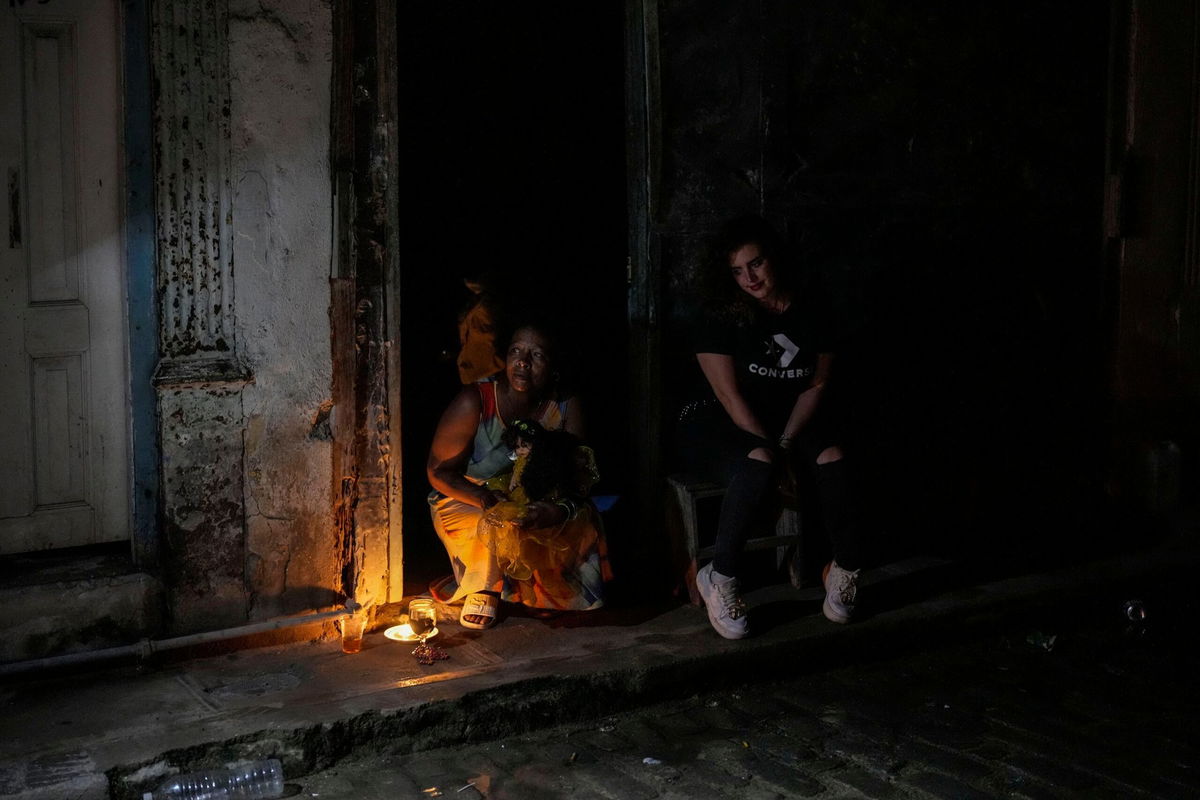Cuban power grid collapses for fourth time as hurricane arrives

Residents pass the time during a blackout following the failure of a major power plant in Havana
Havana, Cuba (CNN) — Hurricane Oscar’s arrival to eastern Cuba Sunday impacted millions of residents already facing days without power, after fresh attempts to restore much of the nation’s electric grid failed.
In the capital city of Havana early Monday, people were seen outdoors in poor lighting, a few playing dominoes to kill time. Children are opting to sleep outside to cool off from the stifling heat indoors – schools have also been canceled until Thursday.
Power had been restored to 88.12% of customers in Havana by Monday afternoon, the city’s government said in a post on X. Though service is believed to be down in much of the country.
It comes after Oscar made landfall near Baracoa along Cuba’s eastern shores around Sunday afternoon as a Category 1 storm with winds of 80 mph. By Sunday night, the National Hurricane Center (NHC) announced that Oscar had weakened to a tropical storm and was moving toward the west-southwest of the country at 6 mph.
“Through Wednesday morning, rainfall amounts of 6 to 12 inches with isolated amounts of 18 inches are expected across eastern Cuba,” the NHC said, adding that as much as 8 inches of rain will appear in isolated amounts in the southeast Bahamas.
Earlier Oscar made landfall on Inagua Island in The Bahamas, with maximum estimated sustained winds of 80 mph, the NHC said.
On Sunday afternoon the Cuban Electrical Union announced that more than 216,000 people in Havana, a city of 2 million, had power restored. The power grid collapsed again later in the day –– for the fourth time since Friday.
Some Cubans took the streets, to protest the three-day-long blackout –– many banging pots and pans and disrupting traffic.
Cuban President Miguel Diaz-Canel criticized demonstrators for causing public disorder, saying in a video posted on X that “we are not going to allow acts of vandalism and much less alter the tranquillity of our people.”
Cuba first descended into darkness on Friday, when one of the country’s major power plants failed, according to the Energy Ministry. Since then, most people in the 10 million-strong country have had their access to power interrupted, while also struggling to maintain fresh food and a steady supply of water.
Havana residents queue for bread
Some people began flooding WhatsApp chats with updates on which areas had power, while others arranged to store medications in the fridges of those who briefly had power – or were lucky enough to have a generator.
In Havana, before power was restored, residents waited for hours to buy a few loaves from the handful of locations selling bread in the capital. When the bread sold out, several people argued angrily that they had been skipped in line.
Many wondered aloud where Cuba’s traditional allies were, such as Venezuela, Russia and Mexico. Until now, they had been supplying the island with badly needed barrels of oil to keep the lights on.
Meanwhile, tourists were still seen circling Havana’s main avenues in classic 1950s cars, although many hotel generators had run out of fuel.
One foreign visitor told CNN that Havana’s José Martí International Airport was operating in the dark on emergency power only, adding that printers did not work to issue tickets and there was no air conditioning in the terminal.
Reuters reporters witnessed two small protests overnight into Sunday, while videos of protests elsewhere in the capital have also surfaced.
The Cuban government is cancelling classes for students from Monday until Wednesday, having previously cancelled them on Friday. It has also instructed non-essential workers to stay home. The US Embassy in Havana will be open only for emergency services on Monday.
Cuban officials have blamed the energy crisis on a confluence of events, from increased US economic sanctions to disruptions caused by recent hurricanes and the impoverished state of the island’s infrastructure.
In a televised address on Thursday that was delayed by technical difficulties, Cuban Prime Minister Manuel Marrero Cruz said much of the country’s limited production was stopped to avoid leaving people completely without power.
“We have been paralyzing economic activity to generate (power) to the population,” he said.
The country’s health minister, José Angel Portal Miranda, said Friday on X that the country’s health facilities were running on generators and that health workers continued to provide vital services.
CNN’s Mia Alberti, Gene Norman, Rob Shackelford and CNN en Español’s Verónica Calderón and Gerardo Lemos contributed to this report.
The-CNN-Wire
™ & © 2024 Cable News Network, Inc., a Warner Bros. Discovery Company. All rights reserved.